How They Voted. Illinois Representatives’ Votes in Congress
Chronicle Media — June 14, 2016UNITED STATES HOUSE OF REPRESENTATIVES
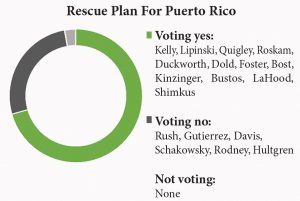 Rescue Plan For Puerto Rico: Voting 297 for and 127 against, the House on June 9 passed a bill (HR 5278) that would establish a federal control board to help Puerto Rico restructure more than $70 billion in debt to bondholders and address its deeply unfunded pension obligations. For a limited time, the Financial Oversight and Management Board would have final say over tax, spending and other budgetary policies for the U.S. territory of 3.5 million Americans. Republicans in Congress would select four of the board’s seven members and Democrats would choose three. The board would need a five-vote supermajority to make major decisions. The bill prohibits using federal taxpayer dollars in the rescue operation. Puerto Rico faces a $2 billion payment to creditors on July 1.
Rescue Plan For Puerto Rico: Voting 297 for and 127 against, the House on June 9 passed a bill (HR 5278) that would establish a federal control board to help Puerto Rico restructure more than $70 billion in debt to bondholders and address its deeply unfunded pension obligations. For a limited time, the Financial Oversight and Management Board would have final say over tax, spending and other budgetary policies for the U.S. territory of 3.5 million Americans. Republicans in Congress would select four of the board’s seven members and Democrats would choose three. The board would need a five-vote supermajority to make major decisions. The bill prohibits using federal taxpayer dollars in the rescue operation. Puerto Rico faces a $2 billion payment to creditors on July 1.
In part, the bill empowers Puerto Rico to impose settlements on holdout creditors; bars most creditor lawsuits; authorizes a lower minimum wage for new workers under 25; allows the dismissal public employees notwithstanding their civil service protections and enables the control board to require a balanced Puerto Rican budget.
James Sensenbrenner, R-Wis., said the bill “does not commit one penny of taxpayer funds to bail out Puerto Rico…. There is no Plan B. If this bill does not pass, Puerto Rico is going to collapse into an economic morass. I haven’t heard anything from (opponents) as to what their alternative is.”
Luis Gutierrez, D-Ill., objected to the powers of the control board and bill’s labor and environmental provisions and said in a written statement: “I did not come to Congress to take money out of the hands of working people and put in the pockets of investment bankers and bond-traders seeking an upper-class lifestyle.”
A yes vote was to send the bill to the Senate.
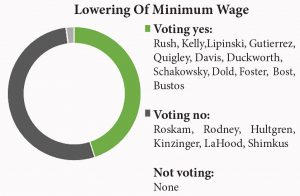 Lowering Of Minimum Wage: Voting 196 for and 225 against, the House on June 9 defeated an amendment to strip HR 5278 (above) of its provision allowing Puerto Rico to reduce its minimum wage for new workers under 25 from $7.25 per hour to $4.25 per hour. Backers said this would help businesses regain profitability, while foes said it would prompt young workers to flee their homeland.
Lowering Of Minimum Wage: Voting 196 for and 225 against, the House on June 9 defeated an amendment to strip HR 5278 (above) of its provision allowing Puerto Rico to reduce its minimum wage for new workers under 25 from $7.25 per hour to $4.25 per hour. Backers said this would help businesses regain profitability, while foes said it would prompt young workers to flee their homeland.
Luis Gutierrez, D-Ill., said in a written statement: “If the genuine needs of Puerto Ricans are subjugated to the artificial privileges of wealthy speculators in the United States, this is not a bill I can support.”
Bradley Byrne, R-Ala., said of the overall bill: “We want to keep them from collapsing….So this is an effort to exercise responsibility in a fiscally sound way.”
A yes vote was in opposition to the bill’s minimum-wage cuts.
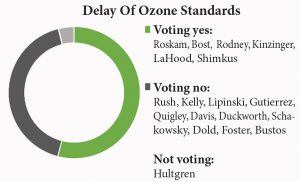 Delay Of Ozone Standards: Voting 234 for and 177 against, the House on June 8 passed a bill (HR 4775) that would delay from 2020 to 2026 the year by which states must submit plans to the Environmental Protection Agency for reducing ground-level ozone emissions within their boundaries. According to the EPA, breathing unsafe levels of ozone causes or triggers ailments such as lung disease and asthma, particularly for children and the elderly. Critics said the ozone regulations would stifle development and cost jobs in counties on the receiving end of ozone pollution that is generated in areas beyond their control.
Delay Of Ozone Standards: Voting 234 for and 177 against, the House on June 8 passed a bill (HR 4775) that would delay from 2020 to 2026 the year by which states must submit plans to the Environmental Protection Agency for reducing ground-level ozone emissions within their boundaries. According to the EPA, breathing unsafe levels of ozone causes or triggers ailments such as lung disease and asthma, particularly for children and the elderly. Critics said the ozone regulations would stifle development and cost jobs in counties on the receiving end of ozone pollution that is generated in areas beyond their control.
The bill also would extend from five to 10 years the interval between EPA adjustments of environmental rules to reflect scientific advances. And it would require the agency take “affordability” and “technical feasibility” into account — along with health effects — in setting rules under the Clean Air Act.
Fred Upton, R-Mich., said: “The good news is, under this bill, ozone levels continue their long-term downward trend, and we can accomplish that goal without jeopardizing jobs.”
Paul Tonko, D-N.Y, said the bill “creates new loopholes through which polluters will add toxic substances to our air and erode the substantial gains we have made in public health under the Clean Air Act.”
A yes vote was to send the bill to the Senate, where it appeared likely to fail.
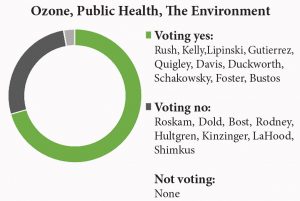 Ozone, Public Health, The Environment: Voting 171 for and 239 against, the House on June 8 defeated an amendment that would undercut HR 4775 (above) by nullifying any provisions that would inflict harm on public health or the environment. The amendment sought to blunt arguments by bill backers that environmental regulations should be weakened in deference to jobs and economic growth.
Ozone, Public Health, The Environment: Voting 171 for and 239 against, the House on June 8 defeated an amendment that would undercut HR 4775 (above) by nullifying any provisions that would inflict harm on public health or the environment. The amendment sought to blunt arguments by bill backers that environmental regulations should be weakened in deference to jobs and economic growth.
Elizabeth Holmes Norton, D-D.C., said the bill “puts our children, communities and (the) environment at extreme risk simply to benefit private corporations….”
Pete Olson, R-Texas, said “nothing in this bill changes any existing air quality standards or prevents…improvements to air quality….”
A yes vote was to adopt the amendment.
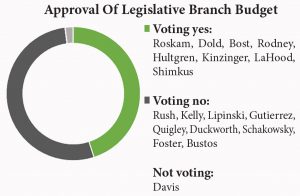 Approval Of Legislative Branch Budget: Voting 233 for and 175 against, members on June 10 passed a bill (HR 5325) that would appropriate $3.48 billion to operate the House and congressional support agencies in fiscal 2017, up nearly 2.7 percent from the 2016 figure. When the Senate adds its own funding, the total legislative-branch budget for next year will exceed $4.35 billion. The bill does not cover members’ salaries, which are funded by a permanent appropriation. (Rank-and-file House members and senators have frozen their pay at $174,000 annually since January 2009.) The bill funds the “representational allowances” used by House members to pay staff salaries and provide constituent services. These allowances ranged from $1.17 million to $1.8 million per member in fiscal 2016. The bill also provides $629 million for the Library of Congress, $560 million for the Architect of the Capitol, $533 million for the Government Accountability Office and $391 million for the Capitol Police.
Approval Of Legislative Branch Budget: Voting 233 for and 175 against, members on June 10 passed a bill (HR 5325) that would appropriate $3.48 billion to operate the House and congressional support agencies in fiscal 2017, up nearly 2.7 percent from the 2016 figure. When the Senate adds its own funding, the total legislative-branch budget for next year will exceed $4.35 billion. The bill does not cover members’ salaries, which are funded by a permanent appropriation. (Rank-and-file House members and senators have frozen their pay at $174,000 annually since January 2009.) The bill funds the “representational allowances” used by House members to pay staff salaries and provide constituent services. These allowances ranged from $1.17 million to $1.8 million per member in fiscal 2016. The bill also provides $629 million for the Library of Congress, $560 million for the Architect of the Capitol, $533 million for the Government Accountability Office and $391 million for the Capitol Police.
A yes vote was to send the bill to the Senate.
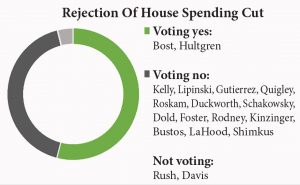 Rejection Of House Spending Cut: By a vote of 165 for and 237 against, members on June 10 defeated an amendment that sought to reduce the House’s own budget (HR 5325, above) by 1 percent or nearly $35 million in fiscal 2017. The underlying bill would raise the House budget by nearly 2.7 percent over the 2016 figure.
Rejection Of House Spending Cut: By a vote of 165 for and 237 against, members on June 10 defeated an amendment that sought to reduce the House’s own budget (HR 5325, above) by 1 percent or nearly $35 million in fiscal 2017. The underlying bill would raise the House budget by nearly 2.7 percent over the 2016 figure.
A yes vote was to trim spending in the 2017 legislative branch appropriations bill.
UNITED STATES SENATE
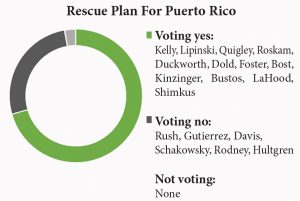 2017 Military Budget: The Senate on June 10 voted, 68 for and 23 against, to advance a $602 billion military budget (HR 4909) for fiscal 2017. In part, the bill authorizes $59 billion in emergency spending for combat operations abroad; $50 billion-plus for active-duty and retiree health care; $3.4 billion for Afghanistan Security Forces; also $3.4 billion for joining with European nations to counter Russian aggression; $1.3 billion for efforts targeted at ISIS and $500 million in security assistance including arms for Ukraine.
2017 Military Budget: The Senate on June 10 voted, 68 for and 23 against, to advance a $602 billion military budget (HR 4909) for fiscal 2017. In part, the bill authorizes $59 billion in emergency spending for combat operations abroad; $50 billion-plus for active-duty and retiree health care; $3.4 billion for Afghanistan Security Forces; also $3.4 billion for joining with European nations to counter Russian aggression; $1.3 billion for efforts targeted at ISIS and $500 million in security assistance including arms for Ukraine.
A yes vote was to advance the bill toward final passage.
— How They Voted. Illinois Representatives’ Votes in Congress —







